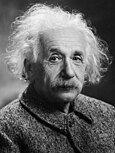Portal:Science/Featured biography/21
Albert Einstein () (March 14, 1879 – April 18, 1955) was a German-born theoretical physicist widely known as one of the greatest physicists of all time. He formulated the special and general theories of relativity. In addition, he made significant advancements to quantum theory and statistical mechanics. While best known for the Theory of Relativity (and specifically mass-energy equivalence, E=mc2), he was awarded the 1921 Nobel Prize for Physics for his 1905 (his "wonderful year" or "miraculous year") explanation of the photoelectric effect and "for his services to Theoretical Physics". In popular culture, the name "Einstein" has become synonymous with great intelligence and genius.
Among his many investigations were: capillary action, his special theory of relativity which stemmed from an attempt to reconcile the laws of mechanics with the laws of the electromagnetic field, his general theory of relativity which extended the principle of relativity to include gravitation, relativistic cosmology, critical opalescence, classical problems of statistical mechanics and problems in which they were merged with quantum theory, including an explanation of Brownian motion; atomic transition probabilities, the probabilistic interpretation of quantum theory, the quantum theory of a monatomic gas, the thermal properties of light with a low radiation density which laid the foundation of the photon theory of light, the theory of radiation, including stimulated emission; the construction of a unified field theory, and the geometrization of physics.

